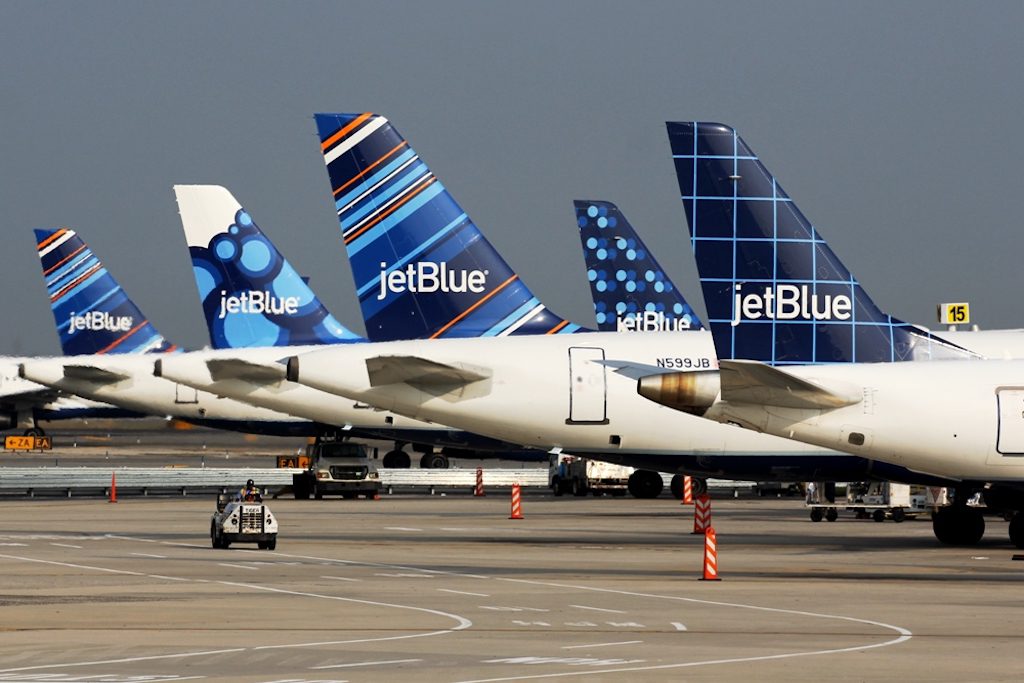Skift Take
JetBlue is pushing ahead with becoming a travel tech company by launching Paisly. But the question remains whether an airline can become a more diverse travel company in the crowded OTA field.
When would-be travelers visit JetBlue Airways’ website they are almost certainly searching for one thing: flights. And that’s a good place to start to book a seat on one of the airline’s nearly 600 daily flights this month.
Enter Paisly, a new travel website developed by the New York-based carrier’s non-air travel arm JetBlue Travel Products. The site offers travelers trip add-ons — initially rental cars, hotels and theme park tickets — tied to their JetBlue reservations.
The launch is the latest step in what JetBlue chief digital and technology officer Eash Sundaram has called the airline’s evolution into a “travel tech company.” Paisly will sit alongside JetBlue Vacations — also part of JetBlue Travel Products — with comparable offerings but on an à la carte rather than packaged basis. These are separate from the airline’s JetBlue Technology Ventures subsidiary that has investments in a range of travel and hospitality start ups, including electric aircraft mobility company Joby Aviation.
Paisly is an “important step” towards the airline becoming more of a travel tech company, JetBlue Travel Products president Andres Barry told Skift. The company sees an opportunity to extend JetBlue’s brand and customer service — which he described as “trusted” — to further aspects of the travel experience. All bookings made through the site will be handled directly by the carrier, so if there is an issue with a car rental or hotel reservation, a JetBlue representative will provide support.
The new website enters the crowded — or empty — online travel space, depending on your view. There are multitudes of travel websites that offer would-be travelers a one-stop shop for à la carte flights, hotels and car rentals, think Expedia or Orbitz. But, from an airline perspective, there are few carriers that offer their own dedicated travel website aside from a package vacations portal. This is separate from the many airlines that offer a link in the booking process to a third-party online travel agency for a car or hotel reservation.
AirAsia is one airline that does act as more of a travel company. The Malaysia-based carrier considers its online portal a “digital travel and lifestyle” site and app. Travelers can reserve everything from flights to ground transfers, hotels and even experiences on the site.
But there is a disconnect between what a brand’s public perception and where it generates its revenue. AirAsia has a strong travel brand presence in Malaysia and parts of Southeast Asia, however, financially its non-airline business is dwarfed by actual flying. In 2019, AirAsia.com revenue was $6.5 million (RM27 million), or less than 1 percent of $2.9 billion in group revenues. Similarly, at JetBlue non-loyalty other revenues were $107 million, or 1.3 percent of its $8.1 billion in operating revenues.
Financially, both AirAsia and JetBlue are a long way from becoming more than airlines.
And the strategy is questionable. During the 1980s, the parent of United Airlines acquired both Hertz and Hilton under a plan by then chairman Richard Ferris to become something of a one-stop travel shop for travelers. The strategy “failed to produce the profits and the large savings” sought by Ferris, prompting his resignation and the divestment of the non-airline brands in 1987, The New York Times reported.
Technology has dramatically changed the travel landscape since the 1980s. And neither AirAsia nor JetBlue plan to horizontally integrate across the travel sector. However, at least in JetBlue’s case, it stands apart from its U.S. peers for its investments in the broader travel technology space.
The “sky is the limit” for what could be sold through Paisly, said Barry. JetBlue hopes to add more hotel and activity options to the platform by the end of the year.
Asked what will JetBlue will consider success for Paisly, Barry said it will be both a combination of customer adoption and experience on the site. He declined to say if there are volume targets for the new site.
Paisly is live and any traveler looking at flights on JetBlue’s website, with an existing reservation, or even in the middle of a trip can surf over to see its travel add ons.
The Daily Newsletter
Our daily coverage of the global travel industry. Written by editors and analysts from across Skift’s brands.
Have a confidential tip for Skift? Get in touch
Tags: jetblue airways
Photo credit: JetBlue has a new website aimed at expanding its presence in the online travel business. Courtesy of JetBlue / JetBlue Airways
